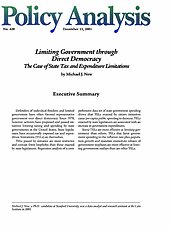TELs passed by initiative are more restrictive and contain fewer loopholes than those enacted by state legislatures. Regression analysis of a comprehensive data set of state government spending shows that TELs enacted by citizen initiatives cause per capita public spending to decrease; TELs enacted by state legislatures are associated with an increase in government expenditures.
Some TELs are more effective at limiting government than others. TELs that limit government spending to the inflation rate plus population growth and mandate immediate rebates of government surpluses are more effective at limiting government outlays than are other TELs.


